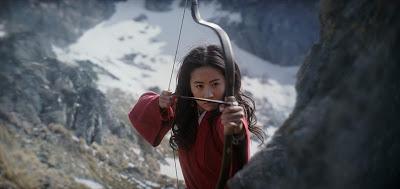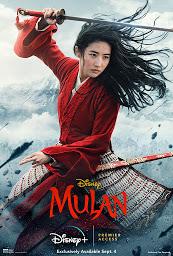
 There's a common saying that you don't know what you have until it's gone. And during this historic COVID-19 pandemic, that sentiment has proven true with the closure of cinemas and the postponement of highly anticipated film releases. But thankfully, the mighty Walt Disney Company has stepped up to quell some of our fears over the future of cinema. With the arrival of "Mulan" on its Disney+ streaming platform, audiences can be reminded of the eye-catching Hollywood production values we've come to know and love. Adapted from the 1998 animated film and directed by Niki Caro, "Mulan" tells the story of a gifted young woman (played by Liu Yifei) living in China during the Han Dynasty. It is a time of war, as the country becomes threatened by northern invaders. Determined to protect the kingdom, the Emperor orders every family to volunteer one man to serve in the Imperial Army. Having no sons, however, Mulan's ailing father is forced to enlist. But in an act of extraordinary courage, Mulan decides to take his place. But to do so, she must disguise herself as a man.
There's a common saying that you don't know what you have until it's gone. And during this historic COVID-19 pandemic, that sentiment has proven true with the closure of cinemas and the postponement of highly anticipated film releases. But thankfully, the mighty Walt Disney Company has stepped up to quell some of our fears over the future of cinema. With the arrival of "Mulan" on its Disney+ streaming platform, audiences can be reminded of the eye-catching Hollywood production values we've come to know and love. Adapted from the 1998 animated film and directed by Niki Caro, "Mulan" tells the story of a gifted young woman (played by Liu Yifei) living in China during the Han Dynasty. It is a time of war, as the country becomes threatened by northern invaders. Determined to protect the kingdom, the Emperor orders every family to volunteer one man to serve in the Imperial Army. Having no sons, however, Mulan's ailing father is forced to enlist. But in an act of extraordinary courage, Mulan decides to take his place. But to do so, she must disguise herself as a man. And so begins a journey of self-discovery as Mulan defies the gendered norms of her society to become a great warrior. Indeed, this swashbuckling epic retains the bold feminism which made the animated film a hit. But this contemporary screenplay has been updated in thought-provoking ways. Whereas the animated Mulan required extensive training to become a warrior, this iteration portrays the character as the "chosen one" trope. From birth, she is blessed with the gift of being able to harness her superpower-like "chi."
But does it make the character more inspiring to young girls and women if she's only equal - or superior - to the men because of her special power? Surely, this important change will reignite the "Mary Sue" debate that plagued the Star Wars franchise. Furthermore, the addition of a bona fide witch named Xian Lang (played fearlessly by Gong Li) somewhat undermines the screenplay's obvious intentions to highlight the triggering "witch" accusations leveled at both Mulan and Xian Lang as a legacy of historical misogyny.
Still, while the handling of these central characters may give you pause, there is no denying the film's impressive visual storytelling. Featuring colorful production and costume design to enhance the glorious setpieces, "Mulan" delivers a grand sense of adventure. But what makes it really stand out from the typical action blockbuster is the way it embraces its Asian influences. From the gravity-defying acrobatics of wu xia, to the graceful intensity of the martial arts-inspired action sequences, it feels truly inspired by the culture of its setting. I even detected a hint of Bollywood flair to one of the pivotal showdowns, as its ostentatious nature reminded me of the "Baahubali" franchise.
As with most Disney remakes, "Mulan" narrative won't get points for originality. But its particular brand of Asian, female-led heroism remains absolutely thrilling. If we continue to get a more diverse representation of women and people of color in our blockbusters, then I'm sure Hollywood's future will be in good hands.
